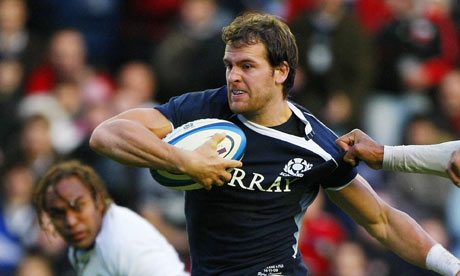
Since Scotland have not beaten Australia since 1982, they may be a bit surprised to find themselves within the same status brackets. But there they are, both deemed to be improving, which is no mean achievement at a time when just about everybody else is being lumped together as dull as ditchwater.
November in Europe is never the kindest month for promotional work, but rarely can so many boos have been launched by so many so long before half-time. The game is kicking itself to death.
Australia arrived as the sick man of the Tri-Nations but have shown that it is a relative insult. Their main problem seemed to involve maintaining a level of performance across a campaign. After beating the Springboks in Brisbane, for example, they were trashed by New Zealand in Wellington.
This hardly makes them the deadbeats of the global game, and at no time was it suggested that when they do fire they do not pose a serious threat to anyone. It's just that they had a habit of going from fearless to faltering.
Ben Alexander, Benn Robinson and Stephen Moore are being touted as the best front row in the world, and if the lineout is still a bit shaky, at least Rocky Elsom, huge on his return to Dublin, sorted it out by making himself the principal target.
Behind the forwards, Will Genia and Matt Giteau are alternating well as strike-forces. The scrum-half was sublime against England and quiet against Ireland. His half-back partner was the other way around, evidence that they are sharp enough to work out who is the more marked on the day and able to let the other plot the attacking course.
Elsom is growing in stature not just as a captain but as a runner, Genia and Giteau are on his shoulder, but lower to the ground, quicker of feet. With a back row and half-backs in unison, teams at least have half a chance of breathing through the pillow over their face.
If Australia have a kicker from hand it seems to be Quade Cooper at 12. Any kick from beyond the outside-half has a more attacking feel to it, but Cooper has positioned himself a lot at 10, and even when on the receiving end of turnover ball, and with tight-five forwards in front of him, has put in downfield.
If Cooper can be persuaded to keep the ball in hand and bring Adam Asley-Cooper into play from full-back there is a chance that Australia could illuminate this miserable month. To be a pass or two away from total release is no bad place.
Scotland are perhaps a bit further back in the quest for freedom. But since they have never quite approached rugby in the same spirit as Australia, for whom Ryan Cross is a late replacement for injured Digby Ioane, it may be pointless to make too many comparisons between the threat of Giteau and the menace of Phil Godman. Scotland, though, have a new vigour, a fresh collective drive, imparted by their coach, Andy Robinson. Being able to announce the same starting line-up after victory in his first game in charge must take the pressure off Robinson the picker of players. He can concentrate all his considerable energies on extracting the best out of his side.
There is size and thrust out wide, from the Lamont brothers and Simon Danielli, but their opportunities may come from a skyward route. And it may be worth remembering that Australia are very good above their heads.
So, it might be something a little more rustic. Or at least, dynamic in confined spaces. If there is an area where Scotland excel it is at close quarters. Unfortunately, the advances there come in units of yards, not the scores that open up the field. A strategy of never going beyond arm's length may suggest another flat Saturday in November. But the weather militates against Scottish daring and, besides, boredom only strikes if both teams fall into the same trap. Australia to win, but not without a storm or three.

